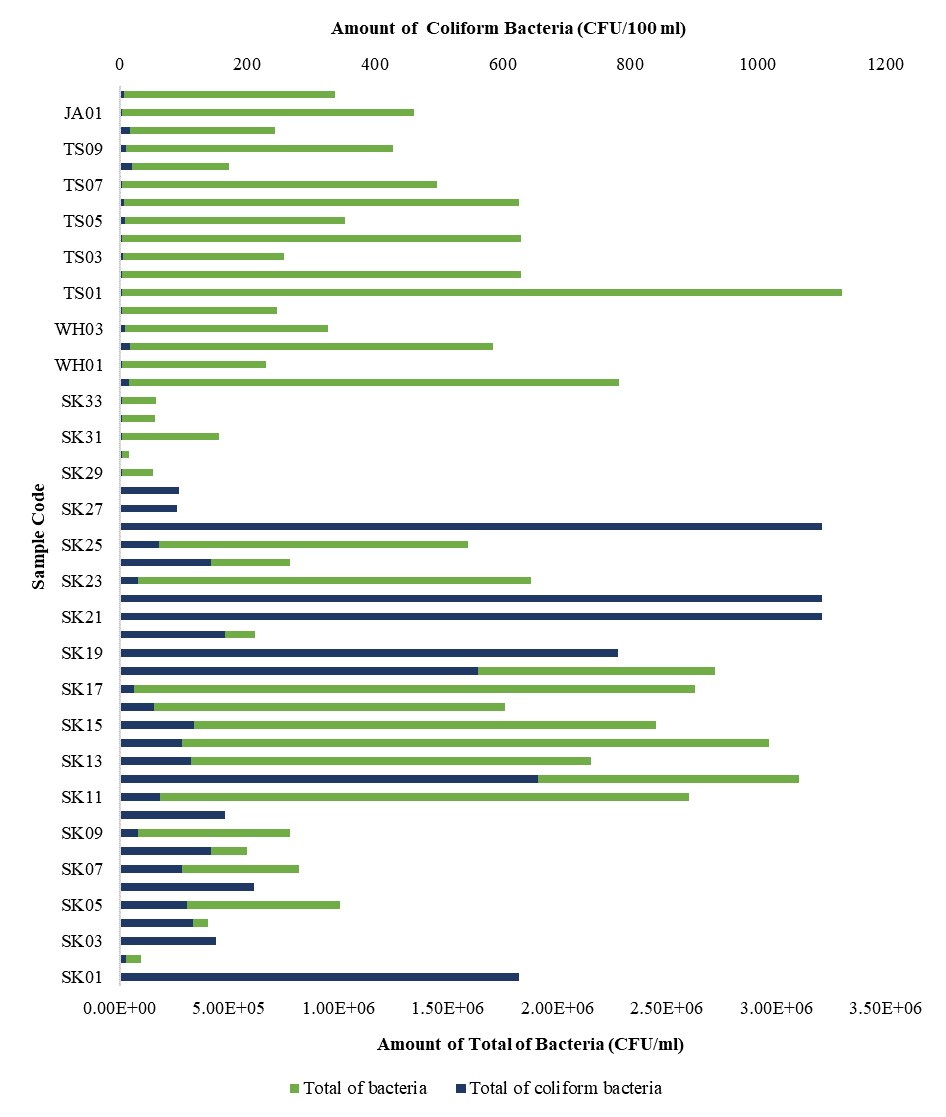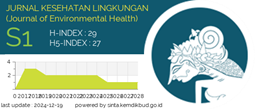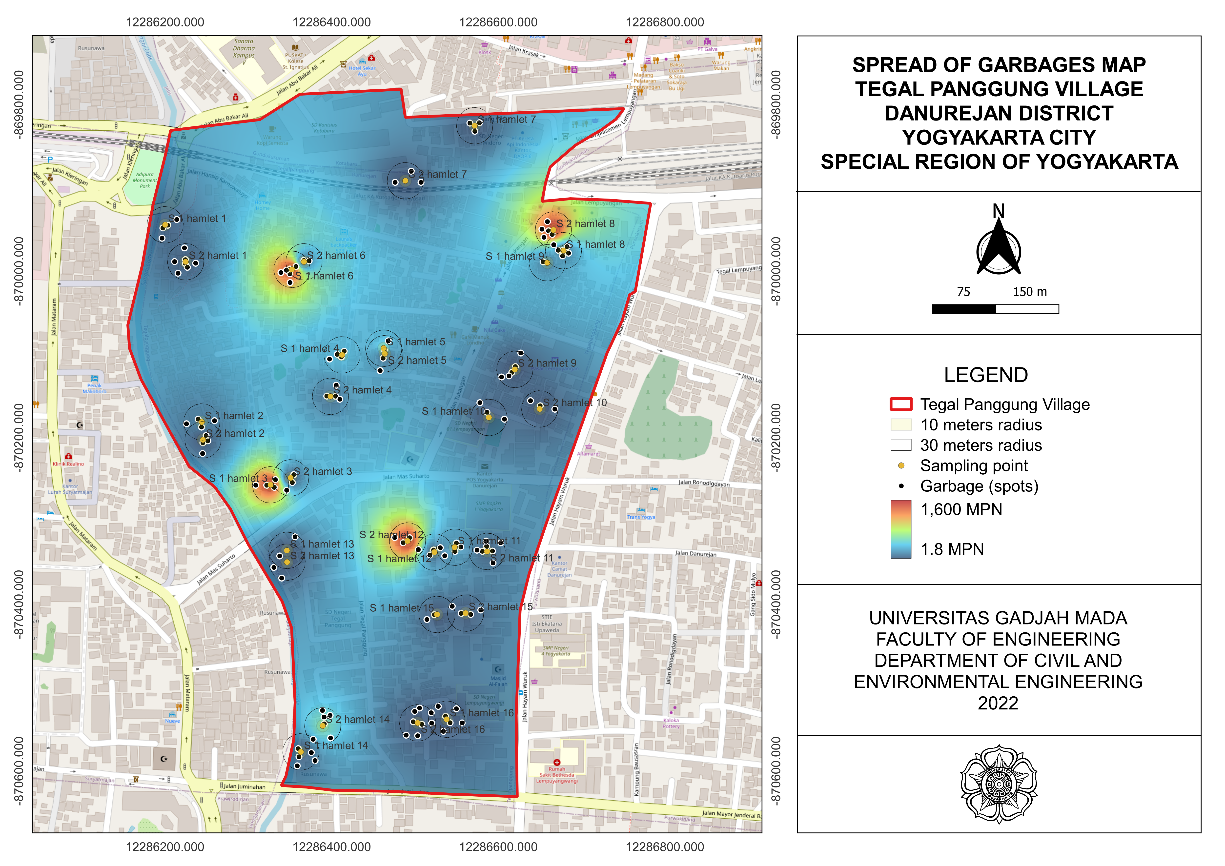Assessment of Bacterial Contaminants Associated with Hygiene Behaviour in Thai Tea Sold on the Roadside Around Educational Area, Lampung, Indonesia

Introduction: Thai tea is one of the aromatic drinks widely sold around the Institut Teknologi Sumatera (ITERA), Lampung, Indonesia. Bacteria often contaminate this drink due to unhygienic handling. The number and types of contaminating bacteria have yet to be widely reported, especially in Lampung province. This study aimed to detect various bacterial contaminants in Thai tea beverages sold on the road in the ITERA region and their relationship with the hygiene behavior of Thai tea sellers. Methods: The sampling technique used in this study involved accidental sampling by detecting microbes using the most probable number method and the specific medium. The number and types of bacteria were analyzed for diversity and correlated with the behavior of Thai tea sellers. Results and Discussion: Of the 50 Thai tea samples, coliform bacteria, and Pseudomonas sp. in all samples (100%), Aeromonas sp. (36%), Shigella sp. (68%), Escherichia coli (76%), and Salmonella sp. (8%). The highest concentration of pollution occurred in Sukarame District (SK). SK10 had the highest number of contaminants, namely, Pseudomonas sp. (2.96x103±165 CFU ml-1), E. coli (7.2x103±190 CFU ml-1), Shigella sp. (3.35x103±350 CFU ml-1) and Salmonella sp. (9.65x103±50 CFU ml-1). The poor quality of Thai tea is caused by unhygienic tea raw materials and the habits of the seller, who does not perform hygienic tasks during the preparation and use of Thai tea. Conclusion: All samples did not meet the requirements for the presence of bacteria in drinking water, based on regulation No.492/MENKES/Per/IV/2010 and World Health Organization.
Roy S, Roy L, Das N. Microbes in my ‘Cup of Tea'. Journal of Botanical Society of Bengal. 2019;73(2):95–102. https://www.academia.edu/41875083/Microbes_in_my_Cup_of_Tea_
Asril M, Rini IA, Agustin R, Ivanka T, Putri AN. Kualitas Bakteriologis Minuman Thai Tea Pinggir Jalan: Studi Kasus Empat Kecamatan Sekitar Kawasan Institut Teknologi Sumatera di Provinsi Lampung. Jurnal Ekologi Kesehatan. 2021;20(1):45–55. https://doi.org/10.22435/jek.v20i1.4636
Carraturo F, De Castro O, Troisi J, De Luca A, Masucci A, Cennamo P, et al. Comparative Assessment of the Quality of Commercial Black and Green Tea Using Microbiology Analyses. BMC Microbiology. 2018;18(1):1–12. https://doi.org/10.1186/s12866-017-1142-z
Tran T, Hoang Khoi P, Minh Tran V, Thi Bich Phuong T, Thi Hong Tuyet L, Doan Thi V, et al. Study on Bacterial Contamination in Hot Trend Street Food - Milk Tea. E3S Web Conferences. 2021;332(05001):1–8. https://doi.org/10.1051/e3sconf/202133205001
Nguyen T, Pham Q, Do Q, Diep T, Phan H, Ho T, et al. Cholera Returns to Southern Vietnam in an Outbreak Associated with Consuming Unsafe Water through Iced Tea : A Matched Case- Control Study. PLOS Neglected Tropical Disease. 2017;11(4):1–15. https://doi.org/10.1371/journal. pntd.0005490
Guzman-Otazo J, Gonzales-Siles L, Poma V, Bengtsson-Palme J, Thorell K, Flach CF, et al. Diarrheal Bacterial Pathogens and Multi-resistant Enterobacteria in the Choqueyapu River in La Paz, Bolivia. PLoS One. 2019;14(1):1–20. https://doi.org/10.1371/journal.pone.0210735
Province Health Office of Lampung. Health Province of Lampung in 2013. Lampung: Province Health Office of Lampung; 2014. https://dinkes.lampungprov.go.id
Ministry of Health of Republic Indonesia. National Research Health Report of 2018. Jakarta: Ministry of Health of Republic Indonesia; 2019. https://kesmas.kemkes.go.id
Huda M. Microbiological Quality of Refillable Drinking Water in Bandar Lampung City Area. In: Seminar Nasional Sains & Teknologi- III. 2010;1(1):629–641.
Ministry of Health Republic of Indonesia. Regulation of Ministry of Health Republic Indonesia No. 492/MENKES/2010 about Quality Requirements of Drinking Water. Jakarta: Ministry of Health Republic of Indonesia; 2010
Poirot E, Som SV, Wieringa FT, Treglown S, Berger J, Laillou A. Water Quality for Young Children in Cambodia- High Contamination at Collection and Consumption Level. Maternal and Child Nutrition. 2020;16(S2):1–9. https://doi.org/10.1111/mcn.12744
Suryani D, Awalia Safitri R, Khofifah H. Identification of Coliform Bacteria Content in ‘Thai tea' Drinks and Its Correlation with Hygiene Factors in Yogyakarta, Indonesia. Public Health of Indonesia. 2021;7(1):41–48. https://dx.doi.org/10.36685/phi.v7i1.388
Hao TS, Mulyana Y, Alisjahbana B. Identification of Enteric Bacterial Pathogens in Beverages Sold by Hawkers Around Jatinangor, Bandung. Althea Medical Journal. 2019;6(1):13–17. https://dx.doi.org/10.15850/amj.v6n1.1536
American Public Health Association. Standard Methods for the Examination of Water and Wastewater. Washington, D.C: American Public Health Association; 1975. https://silo.tips/download/standard-methods-for-the-examination-of-water-and-wastewater-order-form
Desmasures N, Gueguen M. Monitoring the Microbiology of High Quality Milk by Monthly Sampling Over 2 Years. Journal of Dairy Research. 1997;64(2):271–280. https://doi.org/10.1017/S0022029996002130
Beshiru A, Igbinosa IH, Igbinosa EO. Antibiotic Resistance Profile of Pseudomonas aeruginosa Isolated From Aquaculture And Abattoir Environments In Urban Communities. Asian Pacific Journal of Tropical Disease. 2017;7(1):47–52. https://doi.org/10.12980/apjtd.7.2017D6-363
Millipore. 50875 GSP Agar (Pseudomonas Aeromonas Selective Agar acc. to Kielwein, Glutamate Starch Phenol Red Agar). Darmstadt: MilliporeSigma; 2018. https://www.sigmaaldrich.com/deepweb/assets/sigmaaldrich/product/documents/393/938/50875dat.pdf
Keller SE, Stam CN, Gradl DR, Chen Z, Larkin EL, Pickens SR, et al. Survival of Salmonella on Chamomile, Peppermint, and Green Tea During Storage and Subsequent Survival or Growth Following Tea Brewing. Journal of Food Protection. 2015;78(4):661–667. https://doi.org/10.4315/0362-028X.JFP-14-508
Navab-Daneshmand T, Friedrich MND, Gächter M, Montealegre MC, Mlambo LS, Nhiwatiwa T, et al. Escherichia coli Contamination Across Multiple Environmental Compartments (Soil, Hands, Drinking Water, and Handwashing Water) In Urban Harare: Correlations and Risk Factors. American Journal of Tropical Medicine and Hygiene. 2018;98(3):803–813. https://doi.org/10.4269/ajtmh.17-0521
Hassan M, Ahmed F, Rahman MATMT. Quality Analysis of Drinking Water Provided for the Readymade Garment Workers in Dhaka, Bangladesh. Pollution. 2016;2(3):289–298. https://doi.org/10.7508/pj.2016.03.004
Ercumen A, Pickering AJ, Kwong LH, Arnold BF, Parvez SM, Alam M, et al. Animal Feces Contribute to Domestic Fecal Contamination: Evidence from E. coli Measured in Water, Hands, Food, Flies, and Soil in Bangladesh. Environmental Science and Technology. 2017;51(15):8725–8734. https://doi.org/10.1021/acs.est.7b01710
Harwood VJ, Staley C, Badgley BD, Borges K, Korajkic A. Microbial Source Tracking Markers for Detection of Fecal Contamination in Environmental Waters: Relationships Between Pathogens and Human Health Outcomes. FEMS Microbiology Review. 2014;38(1):1–40. https://doi.org/10.1111/1574-6976.12031
Stauber CE, Wedgworth JC, Johnson P, Olson JB, Ayers T, Elliott M, et al. Associations Between Self-Reported Gastrointestinal Illness and Water System Characteristics in Community Water Supplies in Rural Alabama: A Cross-Sectional Study. PLoS One. 2016;11(1):1–11. https://doi.org/10.1371/journal.pone.0148102
Gwimbi P, George M, Ramphalile M. Bacterial Contamination of Drinking Water Sources in Rural Villages of Mohale Basin, Lesotho: Exposures Through Neighbourhood Sanitation and Hygiene Practices. Environmental Health and Preventive Medicine. 2019;24(1):1–9. https://doi.org/10.1186/s12199-019-0790-z
Fuhrmeister ER, Ercumen A, Grembi JA, Islam M, Pickering AJ, Nelson KL. Shared Bacterial Communities Between Soil, Stored Drinking Water, and Hands in Rural Bangladeshi Households. Water Research X. 2020;9(100056):1–10. https://doi.org/10.1016/j.wroa.2020.100056
United States Environmental Protection Agency. Federal Register: National Primary Drinking Water Regulations: Revisions to the Total Coliform Rule. United States: United States Environmental Protection Agency; 2013. https://www.federalregister.gov/documents/2013/02/13/2012-31205/national-primary-drinking-water-regulations-revisions-to-the-total-coliform-rule
World Health Organization. Guidelines for Drinking-Water Quality. Public Health and the Environment World Health Organization. Geneva: Public Health and the Environment World Health Organization; 2009. https://apps.who.int/iris/handle/10665/42852
Akinyeye A, Aborisade W, Akinmolayan A. Bacteriological Evaluation of Abattior Effluent Contaminated Soil in Ikpoba, Benin, Nigeria. Research and Review Journal of Basic Sciences. 2013;1(1):1–6. https://www.academia.edu/6082827/Bacteriological_Evaluation_of_Abattior_Effluent_Contaminated_Soil_in_Ikpoba_Benin_Nigeria_INTRODUCTION
Igbinosa I, Igbinosa E, Okoh AI. Molecular Detection of Metallo- Î’-Lactamase and Putative Virulence Genes In Environmental Isolates of Pseudomonas Species. Polish Journal of Environmental Studies. 2014;23(6):2327–2331. http://www.pjoes.com/Molecular-Detection-of-Metallo-Lactamase-and-r-nPutative-Virulence-Genes-in-Environmental,89415,0,2.html
Ogbomida ET, Kubeyinje B, Ezemonye LI. Evaluation of Bacterial Profile and Biodegradation Potential of Abattoir Wastewater. African Journal of Environmental Science and Technology. 2016;10(2):50–57. https://doi.org/10.4314/ajest.v10i2
Odjadjare EE, Igbinosa EO, Mordi R, Igere B, Igeleke CL, Okoh AI. Prevalence of Multiple Antibiotics Resistant (MAR) Pseudomonas Species in the Final Effluents of Three Municipal Wastewater Treatment Facilities in South Africa. International Journal of Environmental Research and Public Health. 2012;9(6):2092–2107. https://doi.org/10.3390/IJERPH9062092
van Bel N, der Wielen P van, Wullings B, van Rijn J, der Mark E van, Ketelaars H, et al. Aeromonas Species from Nonchlorinated Distribution Systems and Their Competitive Planktonic Growth in Drinking Water. Applied and Environmental Microbiology. 2021;87(5):1–17. https://doi.org/10.1128/AEM.02867-20
Teunis P, Figueras MJ. Reassessment of the Enteropathogenicity of Mesophilic Aeromonas Species. Frontiers in Microbiology. 2016;7(1395):1–12. https://doi.org/10.3389/FMICB.2016.01395/BIBTEX
Beaz-Hidalgo R, Alperi A, Buján N, Romalde JL, Figueras MJ. Comparison of Phenotypical and Genetic Identification of Aeromonas Strains Isolated from Diseased Fish. Systematic and Applied Microbiology. 2010;33(3):149–153. https://doi.org/10.1016/J.SYAPM.2010.02.002
Assefa A, Girma M. Prevalence and Antimicrobial Susceptibility Patterns of Salmonella and Shigella Isolates Among Children Aged Below Five Years with Diarrhea Attending Robe General Hospital And Goba Referral Hospital, South East Ethiopia. Tropical Disease, Travel Medicine and Vaccines. 2019;5(1):1–11. https://doi.org/10.1186/s40794-019-0096-6
Seon YC, Jeon YS, Je HL, Choi B, Sun HM, Von Seidlein L, et al. Multilocus Sequence Typing Analysis of Shigella flexneri Isolates Collected in Asian Countries. Journal of Medical Microbiology. 2007;56(1):1460–1466. https://doi.org/10.1099/jmm.0.47322-0
Yan H, Li L, Alam MJ, Shinoda S, Miyoshi S ichi, Shi L. Prevalence and Antimicrobial Resistance of Salmonella in Retail Foods in Northern China. International Journal of Food Microbiology. 2010;143(3):230–234.
Nisa I, Qasim M, Yasin N, Ullah R, Ali A. Shigella flexneri: An Emerging Pathogen. Folia Microbiologica. 2020;65(2):275–291. https://doi.org/10.1007/s12223-020-00773-w
Nisa I, Qasim M, Driessen A, Nijland J, Rafiullah, Ali A, et al. Prevalence and Associated Risk Factors of Shigella flexneri Isolated from Drinking Water and Retail Raw Foods in Peshawar, Pakistan. Journal of Food Science. 2021;86(6):2579–2589. https://doi.org/10.1111/1750-3841.15777
Ameya G, Tsalla T, Getu F, Getu E. Antimicrobial Susceptibility Pattern, and Associated Factors of Salmonella and Shigella Infections Among Under Five Children in Arba Minch, South Ethiopia. Annals of Clinical Microbiology and Antimicrobials. 2018;17(1):1–7. https://doi.org/10.1186/S12941-018-0253-1
Beyene G, Nair S, Asrat D, Mengistu Y, Engers H, Wain J. Multidrug Resistant Salmonella Concord is A Major Cause of Salmonellosis in Children in Ethiopia. The Journal of Infection in Developing Countries. 2011;5(1):23–33. https://doi.org/10.3855/jidc.906
Beyene G, Tasew H. Prevalence of Intestinal Parasite, Shigella and Salmonella Species Among Diarrheal Children in Jimma Health Center, Jimma Southwest Ethiopia: A Cross Sectional Study. Annals of Clinical Microbiology and Antimicrobials. 2014;13(10):1–7. https://doi.org/10.1186/1476-0711-13-10
Mulatu G, Beyene G, Zeynudin A. Prevalence of Shigella, Salmonella and Campylobacter Species and Their Susceptibility Pattern Among Under Five Children With Diarrhea in Hawassa Town, South Ethiopia. Ethiopian Journal of Health Sciences. 2014;24(2):101–108. https://doi.org/10.4314/ejhs.v24i2.1
Mamuye Y, Metaferia G, Birhanu A, Desta K, Fantaw S. Isolation and Antibiotic Susceptibility Patterns of Shigella and Salmonella Among Under 5 Children With Acute Diarrhea: A Cross-Sectional Study at Selected Public Health Facilities in Addis Ababa, Ethiopia. Clinical Microbiology. 2015;4(1):1–11. https://doi.org/10.4172/2327-5073.1000186
Álvarez-Ordóñez A, Begley M, Prieto M, Messens W, López M, Bernardo A, et al. Salmonella sp. Survival Strategies Within the Host Gastrointestinal Tract. Microbiology. 2011;157(12):3268–3281. https://doi.org/10.1099/mic.0.050351-0
Hossain M, Karim R, Begum S, Islam G, Hoque M. Assessment of Microbial Load in Made Tea and Antimicrobial Property of Made Tea Infusion. International Journal of Public Health Research. 2013;3(2):276–81. http://www.sciepub.com/reference/260442
Julian TR. Environmental Transmission of Diarrheal Pathogens in Low and Middle Income Countries. Environmental Science: Processes and Impacts. 2016;18(8):944–955. https://doi.org/10.1039/c6em00222f
Ariefiansyah MN, Suharti N, Anas E. Identification of Coliform Bacteria Found in Iced Tea Drinks at Purus Seaside Restaurant, West Padang. Jurnal Kesehatan Andalas. 2015;4(3):777–780. https://doi.org/10.25077/jka.v4i3.363
Harris AR, Boehm AB, Davis J. Mechanisms of Post-Supply Contamination of Drinking Water in Bagamoyo, Tanzania. Journal of Water and Health. 2013;11(3):543–554. https://doi.org/10.2166/WH.2013.023
Apriliana E, Ramadhian MR, Gapila M. Bacteriological Quality of Refill Drinking Water at Refill Drinking Water Depots in Bandar Lampung. Juke Unila. 2014;4(7):142–146. https://juke.kedokteran.unila.ac.id/index.php/juke/article/view/401
Birawida AB, Selomo M, Mallongi A. Potential Hazards From Hygiene, Sanitation and Bacterium of Refill Drinking Water at Barrang Lompo Island (Water and Food Safety Perspective). IOP Conference Series: Earth and Environmental Science. 2018;157(2018):1–7. https://doi.org/10.1088/1755-1315/157/1/012034
Cahya T, Amir M, Trijuliamos Manalu R. Uji Cemaran Mikroba Es Batu Pada Penjual Minuman di Lingkungan Pasar Kecamatan Jagakarsa, Jakarta Selatan. Sainstech Farma Jurnal Ilmu Kefarmasian. 2019;12(2):78–84. https://doi.org/10.37277/SFJ.V12I2.448
Warsiyah W, Warniningsih W. Analisis Kualitas Bakteriologis Es Batu di Lingkungan Pasar Kota Gede Yogyakarta. Jurnal Rekayasa Lingkungan. 2020;18(1):1–12. http://doi.org/10.37412/jrl.v18i1.21
Asril M, Amallia RAHT. Pengaruh Pencucian Permukaan Kaleng Minuman terhadap Keberadaan Bakteri Koliform-Fecal. Jurnal Kesehatan Lingkungan Indonesia. 2018;17(1):26–31. https://doi.org/10.14710/jkli.17.1.26-31
Nur J, Asri Winarsih D. Identification of Bacteria Escherchia coli on Ice Cubes in the Region Bojong Raya, Cengkareng, West Jakarta. Jurnal Wiyata: Penelitian Sains dan Kesehatan. 2018;4(2):151–156. http://dx.doi.org/10.56710/wiyata.v4i2.187
Mwove J, Imathiu S, Orina I, Karanja P. Food Safety Knowledge and Practices of Street Food Vendors in Selected Locations Within Kiambu County, Kenya. African Journal of Food Science. 2020;14(6):174–185. https://doi.org/10.5897/AJFS2020.1929
Vriesekoop F, Russell C, Alvarez-Mayorga B, Aidoo K, Yuan Q, Scannell A, et al. Dirty Money: An Investigation Into the Hygiene Status of Some of The World's Currencies As Obtained from Food Outlets. Foodborne Pathogens and Disease. 2010;7(12):1497–1502. https://doi.org/10.1089/FPD.2010.0606
World Health Organization. Essential Safety Requirements for Street-Vended Foods. Geneva: World Health Organization; 1996. https://apps.who.int/iris/handle/10665/63265
Muyanja C, Nayiga L, Brenda N, Nasinyama G. Practices, Knowledge and Risk Factors of Street Food Vendors in Uganda. Food Control. 2011;22(10):1551–1558. https://doi.org/10.1016/J.FOODCONT.2011.01.016
Adi VK, Meghana C, Veena D. Bacteriological Quality Assessment of Street Vended Panipuri and Fruit Juices: A Case Study of Davangere city. Research and Review Journal of Food Science and Technology. 2016;5(2):18–25. https://doi.org/10.37591/rrjofst.v5i2.440

This work is licensed under a Creative Commons Attribution-NonCommercial-ShareAlike 4.0 International License.
1. Copyright of all journal manuscripts is held by the Jurnal Kesehatan Lingkungan.2. Formal legal provisions to access digital articles of electronic journal are subject to the provision of the Creative Commons Attribution-ShareAlike license (CC BY-NC-SA), which means that Jurnal Kesehatan Lingkungan is rightful to keep, transfer media/format, manage in the form of databases, maintain, and publish articles.
3. Published manuscripts both printed and electronic are open access for educational, research, and library purposes. Additionally, the editorial board is not responsible for any violations of copyright law.
JKESLING by UNAIR is licensed under a Creative Commons Attribution-ShareAlike 4.0 International License.






































